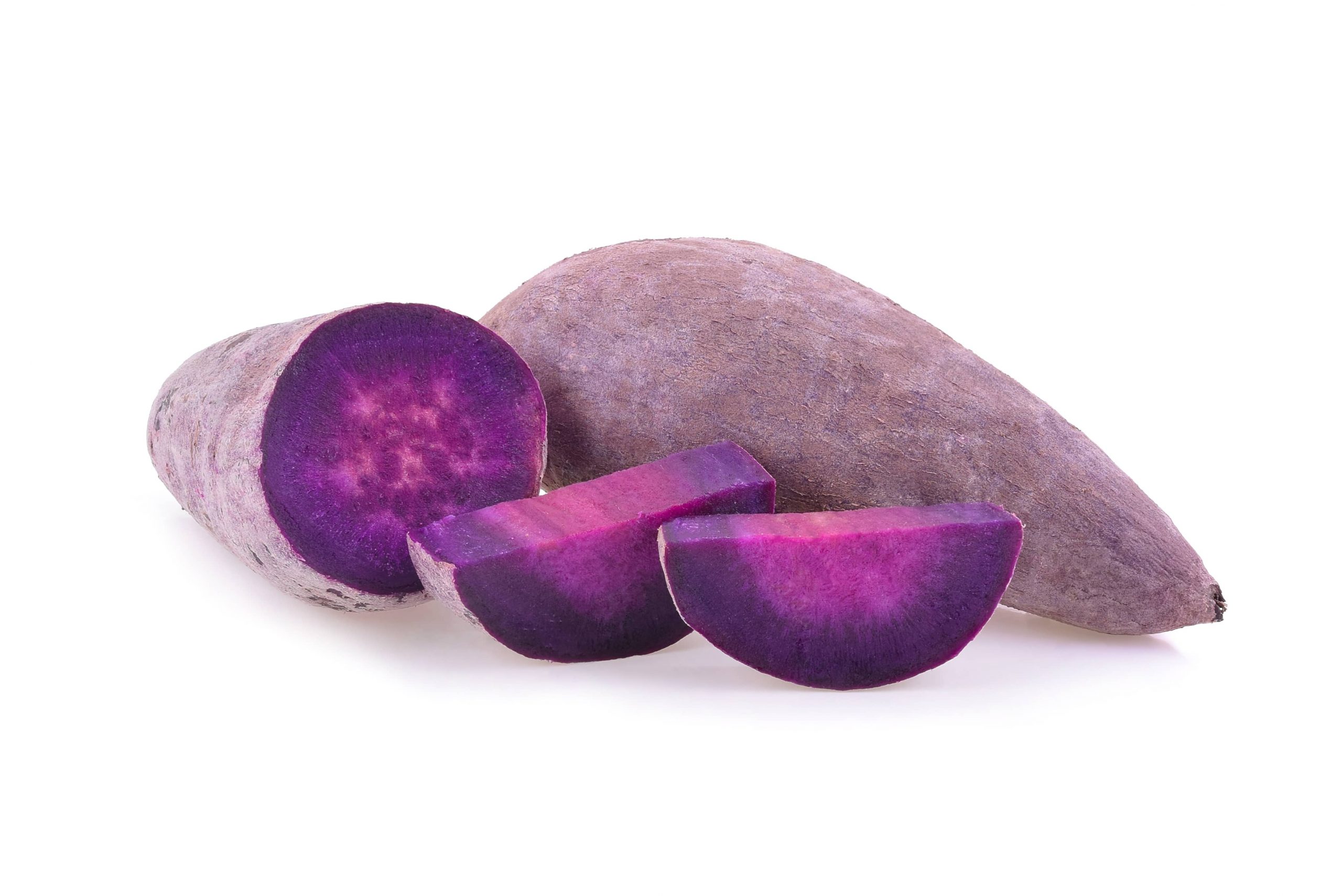Yam is a popular food consumed around the world. However, there are several yam varieties, and some are localized to a specific place of their origin. This blog focuses on purple yam.
Purple yam has various names like ube, violet yam, water yam, or purple yam. Its botanical name is Dioscoreaalata. This species of yam is native to Southeast Asia and is currently grown and consumed worldwide. Many people confuse purple yam with taro root. Distinctly, the skin of ube yam is sort of brown with a deep purple flesh. When cooked, they become very soft like a potato with a sweet taste and a nutty flavor. This article will discuss how eating the purple yam can benefit your health.
They Are Highly Nutritious
The purple yam is an excellent source of carbs and other beneficial nutrients. According to the Food Data Central of the United States Department of Agriculture (USDA) datasheet, 100 g of cooked purple yams contains 140 calories, 27 g of carbs, 4 g of fiber, 0.1 g of fat, 1 g of protein, 0.83% of the daily recommended intake (RDI) for sodium, 13.5% of the RDI for potassium, 2% of the RDI for calcium, 4% of the RDI for iron, 40% of the RDI for vitamin C, and 4% of the RDI for vitamin A.
Ube is also loaded with powerful antioxidants and plant compounds which are responsible for their purplish hue. Anthocyanins are one of them. Studies suggest that eating foods rich in anthocyanins may help reduce the risk of heart disease, chronic inflammation, certain types of cancer, and type 2 diabetes.
Provide Powerful Antioxidants
As mentioned earlier, purple yams are rich in antioxidants like vitamin C and anthocyanins. Antioxidants help protect your tissues from being damaged by oxidative stress. Oxidative stress is a state that usually sets in when free radicals accumulate in your body. This may lead to the development of several chronic conditions like heart disease, cancer, diabetes, and inflammatory diseases. Vitamin C in purple yam act as a powerful antioxidant in your body. Studies suggest that increasing your intake of vitamin C may increase the antioxidants level in your body by up to 35%, which protects against damages caused by oxidative stress.
Anthocyanin is a polyphenol antioxidant. Apart from giving the yam its characteristic color, anthocyanins lower your risk of certain types of cancer. Cyanidin and peonidin are the two active anthocyanins in the purple yam which can prevent the occurrence of colon, prostate, and lung cancers.
May Help Improve Blood Sugar Control
Impaired blood sugar control is an ordeal most people living with type 2 diabetes have to deal with. Purple yams contain flavonoids which may help lower blood sugars. Oxidative stress causes obesity and profound inflammation, which in turn increases your risk of reduced insulin sensitivity or insulin resistance, type 2 diabetes, and impaired blood sugar control. Insulin is a hormone produced from your pancreas and is responsible for the control and maintenance of blood sugars. If your cells fail to respond properly to this hormone, then you may develop insulin resistance. Studies suggest that the flavonoid extract of purple yam may reduce insulin resistance and oxidative stress. This is achieved by protecting the beta cells and other cells producing insulin.
Similarly, purple yam extract may help reduce appetite, promote weight loss, and manage blood sugar control. What’s more, the purple yam scores low on the glycemic index. The glycemic index (GI) is a tool used to measure how fast a particular food can raise the blood sugars. GI ranges between 0 and 100. Purple yam has a GI score of 24, meaning that they cannot raise your blood sugar faster. Instead, their carbs are broken down slowly to produce energy.
May Improve Blood Pressure Control
Heart disease and high blood pressure are the leading causes of global deaths. They are also the main risk factors for strokes and heart failure. The rich antioxidant content of purple yams is believed to have effects that can lower blood pressure. Studies suggest that these effects are similar to that of angiotensin-converting inhibitors (ACE inhibitors) – a conventional medication used to lower blood pressure in hypertensive patients. Additionally, one animal study suggests that antioxidants found in purple yams can help block the conversion of angiotensin one to angiotensin two, which is a compound associated with increased blood pressure. However, these studies are proven in the lab and therefore calling for more human studies to attest to these claims.
May Help with Asthma
People living with asthma struggle with difficulty breathing, especially when exposed to allergens. Asthma is a condition of the respiratory system characterized by the inflammation of the airway. Researchers believe that increasing your intake of antioxidants such as vitamin C and vitamin A may help reduce the severity of symptoms associated with asthma. The occurrence of asthma, according to published studies, is linked with low intake of both vitamin A and C. Including purple yam in your diet is a sure way of increasing your intake of vitamin C and A and keeping asthma away.
May Improve Gut Health
Constipation, diarrhea, and other abdominal discomforts are common digestive health problems. Fortunately, purple yam may help promote your digestive health. Ube yams are loaded with resistant starch and complex carbs. Resistant starch escapes digestion in the upper digestive tract. When it reaches the large intestines, it is fermented and digested by the good gut bacteria that also feed on them. Apart from increasing the number of these bacteria, resistant starch fatty acids and various B vitamins ube may also reduce inflammation in the gut. This helps prevent colorectal cancer, irritable bowel syndrome (IBS), and inflammatory bowel disease (IBD). Additionally, studies suggest that the anti-inflammatory effects of the purple yam may help reduce the risk for diverticulitis and colitis.
Conclusion
Purple yam is a species of yam with brown skin and deep purple flesh which becomes soft like a potato when cooked properly. It has many names, including ube and violet yam. Eating ube may help improve your gut health and reduce the severity of the symptoms of asthma.
- Bell Peppers 101: Nutrition Facts and Health Benefits - April 19, 2024
- Products That Assist with Stress Relief - September 21, 2023
- TRÈFLE – THE ROAD TO THE 15TH - July 29, 2023









